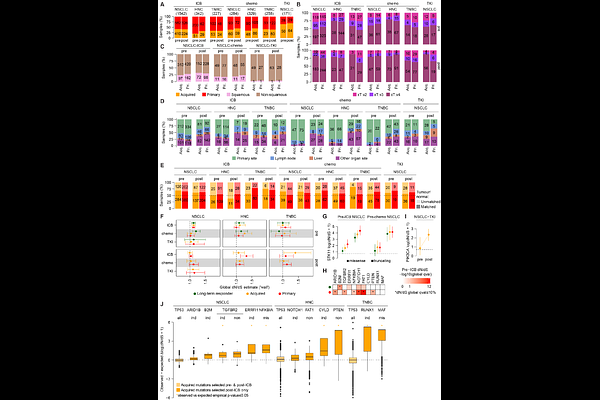Pan-cancer analysis in the real-world setting uncovers immunogenomic drivers of acquired resistance post-immunotherapy

Pan-cancer analysis in the real-world setting uncovers immunogenomic drivers of acquired resistance post-immunotherapy
Keddar, M. R.; Carrasco Pro, S.; Rabbie, R.; Kalender Atak, Z.; Camelo Stewart, A.; Hammond, S. A.; Douglas C. Palmer, D. C.; Stewart, R.; Burke, K.; Sidders, B.; Davies, J.; Dry, J.; Martincorena, I.; khosla, S.; Schoenfeld, A. J.; Miller, M. L.
AbstractImmune checkpoint blockade (ICB) has revolutionised cancer therapy, yet resistance - both primary and acquired - remains a significant obstacle, affecting the majority of patients. Here, we leveraged a large-scale, real-world clinicogenomic dataset to systematically explore the molecular underpinnings of ICB resistance in the post-progression setting. Analysing over 5,000 pan-cancer patients with clinical and pre-/post-treatment genomic and transcriptomic data, we identify distinct immunogenomic drivers of acquired vs. primary ICB resistance. Post-ICB progression, acquired resistance showed extended survival compared to primary resistance across all cancer types. The acquired resistance clinical phenotype was paralleled by a universally immune-inflamed, albeit dysfunctional, tumour microenvironment (TME) at the onset of acquired resistance, with sustained or ICB-induced inflammatory and interferon responses. We confirm previously described mechanisms of acquired resistance, including B2M loss-of-function (LoF) in non-small cell lung cancer (NSCLC), and identify novel potential mediators, including LoF of TGFBR2 in NSCLC, CYLD in head and neck cancer, and RUNX1 in triple negative breast cancer. Further supporting their involvement in resistance, these acquired ICB alterations associated with immune-escaped TMEs, characterised by active immunomodulatory oncogenic signalling, hyperproliferation and invasiveness, or altered tumour metabolism. These findings emphasise the heterogeneity of molecular drivers of acquired resistance to ICB within and across cancers, and highlight the potential for personalised therapeutic interventions post-progression to improve patient outcomes.